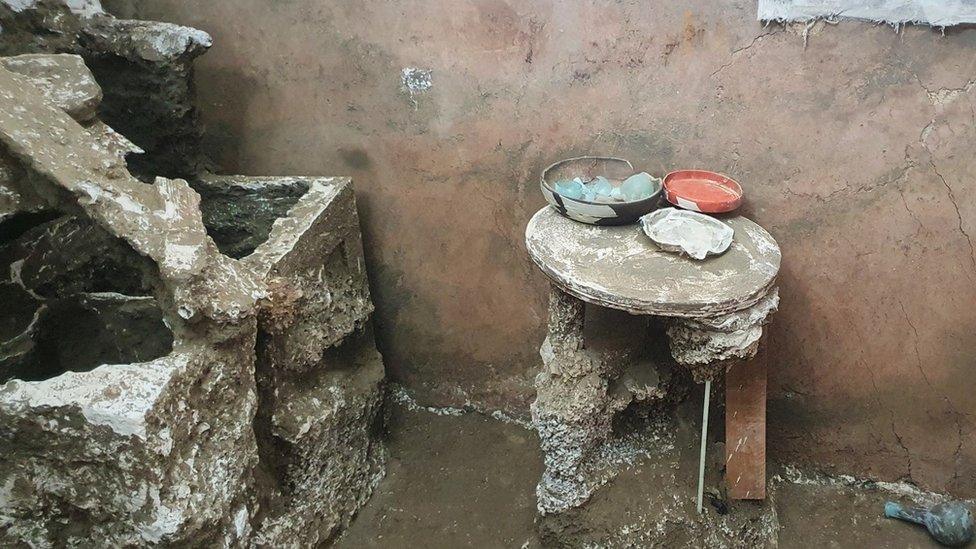Pompeii discovery shows life for ordinary people
- Published
- comments

An opened trunk and a stool which was discovered in one of the rooms
A half-opened trunk, a wooden cupboard for dishes and a perfume burner are some of the objects newly discovered in Pompeii.
Archaeologists discovered four new rooms in a house in the ancient Roman city which give a rare snapshot of everyday life nearly 2,000 years ago.
Pompeii, which is near modern Naples in Italy, is one of the world's most important archaeological sites.
In 79 A.D Mount Vesuvius, a nearby volcano erupted, covering the then busy city of Pompeii with ash.
The ash preserved the homes, objects and even people who had lived there.
Since the 1700s, archaeologists have dug and uncovered different parts of Pompeii to find out more about life in the city through excavation work.
Every year thousands of tourists visit the site which Pompeii which is one of the most famous places in the world
Up until now it was the grandest villas of the upper-class citizens of Pompeii that had been examined, but more recently the homes of middle-class residents, workers and enslaved people have all been studied.
The remains of bowls, a hastily emptied trunk, a bed and a crib-shaped terracotta perfume burner were found on two floors of a previously-excavated building.
The interior of a cupboard closed for almost two thousand years complete with dishes
Some were more valuable than others - vessels made of bronze or glass next to everyday tools.
The park's director, Gabriel Zuchtriegel, said learning more about how normal people lived was very valuable.
He added: "A large slice of the population in the Roman Empire were people who sweated for their daily bread but were also anxious to raise their social status."
A rare painted ceramic perfume burner,
Plaster casts have been used to reproduce some of the objects, including a bed made of a wooden frame as well as cupboards left behind by people fleeing the volcanic eruption.
Many were found in a home which was unearthed in 2018 and has been nicknamed the Larario house because of an outdoor area dedicated to Lares, gods who the Roman's believed guarded their household.
The wall of the courtyard of the home which was unearthed in 2018 is decorated with figures
The courtyard of the building was found beautifully decorated with fresco paintings of plants, birds and hunting scenes, but the park's director says this level of extravagance could not be seen in other parts of the house.
"The owners of the Larario house in Pompeii had been able to decorate the courtyard hosting the Lares site and a well with outstanding paintings, but evidently they didn't have enough money for all of the rooms," Zuchtriegel said.
